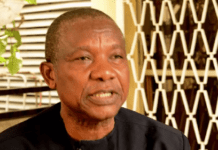The Minister of State for Health, Dr. Ali Pate, in this interview with Pharmanews analysed how polio campaigns and other health-related programmes have been boosted by funds expended in the campaigns. He also spoke about efforts of the ministry to provide good health care for Nigerians.
Below is the interview:
Nigerians believe that, instead of putting money into polio campaign, funds should go round the entire health care sector. What is your view on that?
The approach we have is diagonal. In public health, there has always been this tension between vertical programmes – mass campaigns to distribute bed nets, to deworm and horizontal approaches, which are more longer term and more difficult, because you need physical facilities, infrastructure, human resources. But it is not either or, so we take the diagonal approach; which means as we are strengthening the quality of supplemental implementation activities through the polio campaign, and we are seeing results from it, we should also strengthen the quality of infrastructure, human resources and ensure stability of the vaccine.
We are seeing progress; we had lots of campaigns in 2008, 2009, 2010 and we saw routine immunisation continue to go up, despite the campaigns. We went up 67 per cent. Now we are down and trying to go back up. You find that the system can be strengthened while you are tackling polio.
We should tackle polio because there are only three countries in the world that have not interrupted transmission. Some of these countries don’t have good routine immunisation but they have been able to successfully interrupt polio, as part of global eradication. We can’t wait until we have strengthened our routine immunisation through the local government and state involvement before we eradicate polio. If we wait two, three more years, that will not be optimal because the rest of the world is watching us.
The imperative to finish the task of eliminating polio is there, given that it is the only disease right now of a global nature targeted for eradication, and it is overdue for eradication. But while we are doing that, we are also strengthening routine immunization; financing for vaccines through UNICEF is assured; maintenance of the cold chain; accountability framework developed by the agency responsible for this, so you can track performance for each state.
16 states – Kwara, Niger, Adamawa, Kaduna, Katsina, Zamfara, Abia, Anambra, Ebonyi, Enugu, Imo, Cross River, Ondo, Ekiti, Osun, Oyo achieved target 78 per cent DPT coverage in February 2013, compared to no state in the same month in 2012. 35 states performed better in 2013, compared to the same period in 2012, and 33 out of them had very remarkable improvement. Routine immunisation in Nigeria is improving, despite the focus on polio.
An average Nigerian may think poor funding of the polio campaign is a major reason polio is yet to be eradicated; that is why Nigerians are wondering how much is spent on polio.
That school of thought is pessimistic. We have seen steady increase in the quality of the polio campaign in the last several months, with reduction in wild polio virus. In 2013, we have only 13 cases of type 1. For the last five and half months, we have not seen type 2 or 3 for the first time in Nigeria. Last year, at this time, we were worried about Kano, Jigawa, Kaduna, Katsina, Sokoto, Zamfara, Kebbi, because they were transmitting the virus.
This year, we don’t have a single case from them. The sanctuary for the virus is now more the Borno-Yobe axis, and particularly areas where we have had problems reaching children, and children from those places can infect others. Even in those areas, we are seeing tightening of the effort. Given what we are seeing, I think the effort the Presidential Task Force is putting in is yielding results.
We had an assessment in 2011 when I was with the NPHCDA of the efficiency of the polio programme. A report then showed that Nigeria’s polio eradication programme was one of the most efficient of all the remaining countries, in terms of number of children being reached. India that eradicated put $300 million of its own budget annually.
For us, for many years it has been roughly $20 million that the Nigerian government puts in. But the Presidency, when it announced the task force in 2011, announced an increase of $10 million over two years, and that is what the programme has – $30million, and that is less than in 2012. What FG spent on polio – in terms of contribution to pool funds to pay for the vaccines – was less than the amount we spent on the routine vaccines.
This year, the amount the FG is expending on polio exercise is roughly the same as what is allocated for routine this year, because the routine vaccination effort is being complemented in kind by global partners like GAVI that are providing vaccines – where FG pays counterpart funding for the pentavalent vaccine.
Where does the polio funding go? There are only three categories of expenditures – one is purchasing the vaccine; the second is technical assistance, which is not funded by government, but funded through partners by funds given to WHO and UNICEF to support the programme; the third is operations. When you have a national campaign, sometimes you get almost 300,000 vaccinators who go round the country, including those who were killed. They get paid from a dedicated funding mechanism managed by WHO.
Government doesn’t pay directly but transfers government’s own contribution, as part of a pool. We contribute 40 – 50 per cent, the other partner puts in 50 – 60 per cent to help pay the vaccinators. Government cannot shoulder the entire burden alone. We are not putting in what India was putting it. This partnership leverages what government and its partners are putting in but are handled by the WHO. The only remaining part is what the NPHCDA will hold onto for its transport, logistics and communication. It is modest, compared to the total programme funding. In truth, the polio effort is not one that is inefficient. It is efficient and proven to be effective.
The fact that we have done almost six months without type 2 and 3 tells you we are making progress. If we do another six months, for the first time in the history of this country, we would have interrupted two types of polio virus. Of course, it is new but people don’t want to believe and they are scratching their heads.
We expect states and local governments to complement. Federal Government buys and distributes for free. What we expect is to see more states step up to invest their resources in complementary ways – strengthen their cold chain, buy cold refrigerators, logistics and transport for their vaccinators, deal with renovation primary healthcare centres, recruiting midwives. Instead of focusing on whether we are spending too much, we should ask that states and local government complement what government is doing. At the end, we want routine immunisation to help strengthen our effort in primary health care. It is an entry point for strengthening the primary healthcare.
Considering the epileptic nature of power supply, which could affect the given temperature of vaccines at rural areas, how safe are the vaccines?
Some weeks back, I was published from Malumfashi, where I was immunised. I took the vaccines because it is safe, and I also gave to my son. All my children are immunised. The governor of Kaduna State immunised his own son; in Katsina, the deputy governor, who had an eligible child, immunised him in the just concluded April round; Alhaji Aliko Dangote, who is the wealthiest man on the African continent today, brought his granddaughter in Kano and immunised her in public.
Dangote can buy any hospital, any drug for his granddaughter, but he used public vaccine to demonstrate its safety. His eminence, the sultan of Sokoto, will not immunise somebody in his house, if he thinks it is not safe. Governors from other parts of the country have immunised their children. All of these people will not connive and give something they know is not safe to our people.
Some time back, 437 scientists from 80 countries signed a declaration to say it is safe and effective. We should be talking about progress; we should not be going backwards. Claiming that this is not safe is not really progress. Look at countries like Niger, Ghana, Chad, India they have gone beyond that. We should also be talking in terms of progress of humanity.
We are not the only people on the planet and we don’t love our children more than other people love their children. Whatever geniuses we have, we are not the only geniuses on earth. I advise, let’s be constructive. It is easy to say, “Don’t take vaccine,” but what is the alternative?













